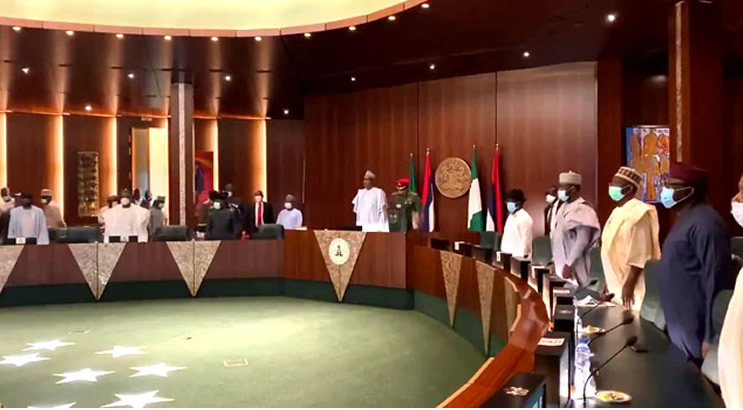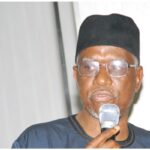
A federal cabinet member’s recent accusations that state governors are primarily responsible for the excruciating poverty in the country and their push-back highlight the woeful incompetence of Nigeria’s leaders. Clement Agba, the Minister of State for Budget and National Planning, rebuked the governors for neglecting the rural areas and thereby entrenching poverty. With a new report by the National Bureau of Statistics aggregating the number of poor Nigerians at 133 million, there is enough blame to go round: the Federal Government’s incompetence induces poverty, and the state governments entrench it.
Critics, particularly the governors, have indignantly accused Agba of shifting the blame for the prevailing hardship in Nigeria from the central to the sub-national governments, but a deep reflection on the minister’s submission lends credence to the governors’ role in entrenching mass poverty. Both tiers of government have failed woefully in quality service delivery, but the governors’ deficiency is excruciating given their superintendence over the country’s entire land area outside of the Federal Capital Territory.
From 2018, the World Poverty Clock had listed Nigeria as the country with the highest number of the world’s extremely poor people with 86.9 million persons, overtaking India. The minister pointed out that governors misplace priorities by opting for white elephants like fanciful overhead bridges at state capitals instead of developing the rural communities.
This resonates. Rural infrastructure, declares the Asian Development Bank, results in economic growth, sustainable and socially inclusive development, and poverty reduction.
But denied basic amenities, jobs and entrepreneurial opportunities, the percentage of Nigeria’s population living in rural areas has been declining steadily. From over 70 per cent in the 1970s, the rural population fell to 56.25 per cent in 2010, according to Trading Economics, and 47.25 per cent in 2021.
There are very few motorable roads in the rural areas where agriculture, the largest contributor to GDP, is the main occupation. The NBS says agriculture contributed 25.9 per cent to GDP in 2021 compared to trade (15.7 per cent); ICT (15.5 per cent) and manufacturing (9.0 per cent). By law, land is under the control of governors, giving them considerable leeway to attract and direct investments in agriculture, mining, manufacturing, and job creation. But they prefer to construct edifices in cities.
The multidimensional poverty study found that 72 per cent of the poor Nigerians live in the rural areas. Since the 36 states control these communities except the FCT, the governors should face the biting reality that they have failed.
Besides, the minister’s exposition that governors prefer to build airports in their state capitals rather than basic amenities in the hinterland is painfully visible. Many states have completed or are in the process of completing airports, which remain mostly idle as the economic activities that promote travel are largely absent.
An airport is worthless where the majority are poor and lack basic facilities. They need decent roads to move goods to the urban centres. Nigeria’s food crisis is partly traced to its dilapidated roads; with producers unable to convey agricultural produce to the markets, goods perish before reaching the consumers. ActionAid estimates that Nigeria suffers post-harvest losses of N3.5 trillion annually due to impassable roads and the absence of storage facilities. Another NGO, Ecosystem-based Adaptation for Food Security Assembly, said Nigeria suffered 75 per cent post-harvest losses.
The governors should address this; stop their wasteful habits, such as expensive vehicle convoys, aircraft, and hiring battalions of aides. They should rather accord utmost priority to social services, rural development, and investment stimulation.
They should aspire to be self-sustaining economic units like sub-national territories in other federations; save for Lagos and lately Kaduna, they lack economic plans with key macroeconomic growth targets. Apart from Lagos, the states can hardly survive without federal allocations.
Worse, they misuse statutory allocations and corruption thrives. The Federal Government in the past seven years disbursed N1.98 trillion to the oil-producing states as part of the backlog of the 13 per cent oil derivation. But typically, Bayelsa, a major beneficiary and least populous, was rated the state with the second highest incidence of poverty after Sokoto in the multidimensional poverty report. Also, they emasculate the local governments and seize their 20.60 per cent of federally allocated revenue, thereby depriving the grassroots of basic amenities.
In other federations, federating units have comprehensive economic plans with GDP growth, job creation, and investment and infrastructure targets, leveraging their areas of strength. If the state of California, United States, were a country, it would be the world’s fourth largest economy in 2021 with its GDP of $3.37 trillion, behind Japan. It achieved this by concentrating on agriculture, ICT, and renewable energy industry.
Nigeria’s governors should critically review their errant ways. They are wasteful and inept in generating IGR. Coupled with corruption and aimlessness, and similar maladministration by the centre, poverty is on the march.
They should reduce the cost of governance, and invest in the rural areas. They should develop their mineral resources. For example, Kogi has 44 mineral types, Nasarawa over 16, Ondo bitumen, and Zamfara, gold.
However, the states’ misbehaviour does not exculpate the Federal Government as the ‘senior’ co-culprit in the abysmal poverty in the country. It takes 52.68 per cent of nationally collected revenue, while the 36 states share 26.72 per cent. Yet, federal roads, hospitals, universities, and economy, are in a shambles. Debt is mounting with little to show for it.
There has been a vigorous push-back from the governors who argue that it is the central government that instigates poverty. True, by mismanaging its aberrant monopoly over law enforcement, insecurity across the country has seen farmers fleeing the rural areas and roads.
This tallies with the defence of the governors that “the Federal Government, which is responsible for the security of lives and property, has been unable to fulfil this covenant (of protection) with the people, thus allowing bandits, insurgents, and kidnappers to turn the country to a killing field…”
Therefore, the Federal Government, led by the President, Major General Muhammadu Buhari (retd.), should crush insecurity to allow the farmers to return to the farms and facilitate commercial activities. The governors should drop their poverty-inducing ways and imbibe the ethos of service.





